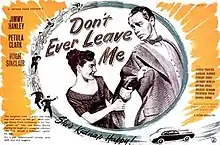Don't Ever Leave Me
Don't Ever Leave Me is a 1949 British comedy film directed by Arthur Crabtree and starring Petula Clark, Jimmy Hanley, Hugh Sinclair, Edward Rigby, and Anthony Newley. Produced by Betty Box during her stint at Gainsborough Pictures, it was written by Robert Westerby.
| Don't Ever Leave Me | |
|---|---|
 Original poster | |
| Directed by | Arthur Crabtree |
| Written by | Anthony Armstrong |
| Produced by | Betty Box |
| Starring | Petula Clark Jimmy Hanley Hugh Sinclair |
| Cinematography | Stephen Dade |
| Edited by | A. Charles Knott |
| Music by | Lambert Williamson |
Production company | |
| Distributed by | General Film Distributors |
Release date | 19 July 1949 |
Running time | 85 minutes |
| Country | United Kingdom |
| Language | English |
Plot
The plot, a variation on The Ransom of Red Chief, revolves around Sheila Farlaine (Clark), the teenaged daughter of Shakespearean tragedian Michael Farlaine (Sinclair), who is kidnapped by elderly crook Harry Denton (Rigby) when it's suggested he no longer has what it takes to be a master criminal.
When Harry starts having second thoughts about the caper, Sheila - tired of playing second fiddle to her egotistical father's career - becomes the mastermind of the plot and resists every effort made by Harry's grandson Jack (Hanley) to return her home before things get serious. However, in this strange scenario Sheila wants to be kidnapped, as it gives her the opportunity to act grown up and she thinks her father will at last take some interest. He meanwhile embraces the role of worried parent for whom "the show must go on" and thrives on the newspaper publicity. Sheila begins to take a romantic interest in Jack, and despite her only being 15 (and three-quarters), she blackmails him into taking her out to clubs and casinos, wining, dining and dancing. Jack's girlfriend is less than happy when she discovers this.
Then Sheila's friend Jimmy (Newley) decides that he too wants to be "kidnapped" and becomes a general nuisance to one and all.
Production
Taking advantage of Clark's vocal abilities, screenwriter Westerby included two scenes in which she sang the tune "It's Not for the Want of Trying" by songwriters Jack Fishman and Peter Hart. The film, Clark's twelfth, allowed her to play a more mature role than in previous outings, and was both a critical and commercial success.
Anthony Steel has one of his earliest screen appearances.[1]
Cast
- Jimmy Hanley as Jack Denton
- Petula Clark as Sheila Farlaine
- Linden Travers as Mary Lamont
- Hugh Sinclair as Michael Farlaine
- Edward Rigby as Harry Denton
- Anthony Newley as Jimmy Knowles
- Barbara Murray as Joan Robbins
- Brenda Bruce as Miss Smith
- Maurice Denham as Mr. Knowles
- Frederick Piper as Max Marshall
- Sandra Dorne as Ruby Baines
- Russell Waters as Mr. Robbins
- Anthony Steel as Harris
- Michael Balfour as Jim Kennedy
- James Hayter as Man with Summons
- Dandy Nichols as Mrs. Marshall
- Cyril Chamberlain as News Reporter
- Philip Stainton as Detective Inspector
- John Salew as Farlaine's Manager
- Barbara Leake as Mrs. Brand
- Arthur Hambling as Policeman at Jack's Flat
- Martin Miller as Leon Stoltz
- Ben Williams as Superintendent in Cells
References
- Vagg, Stephen (23 September 2020). "The Emasculation of Anthony Steel: A Cold Streak Saga". Filmink.